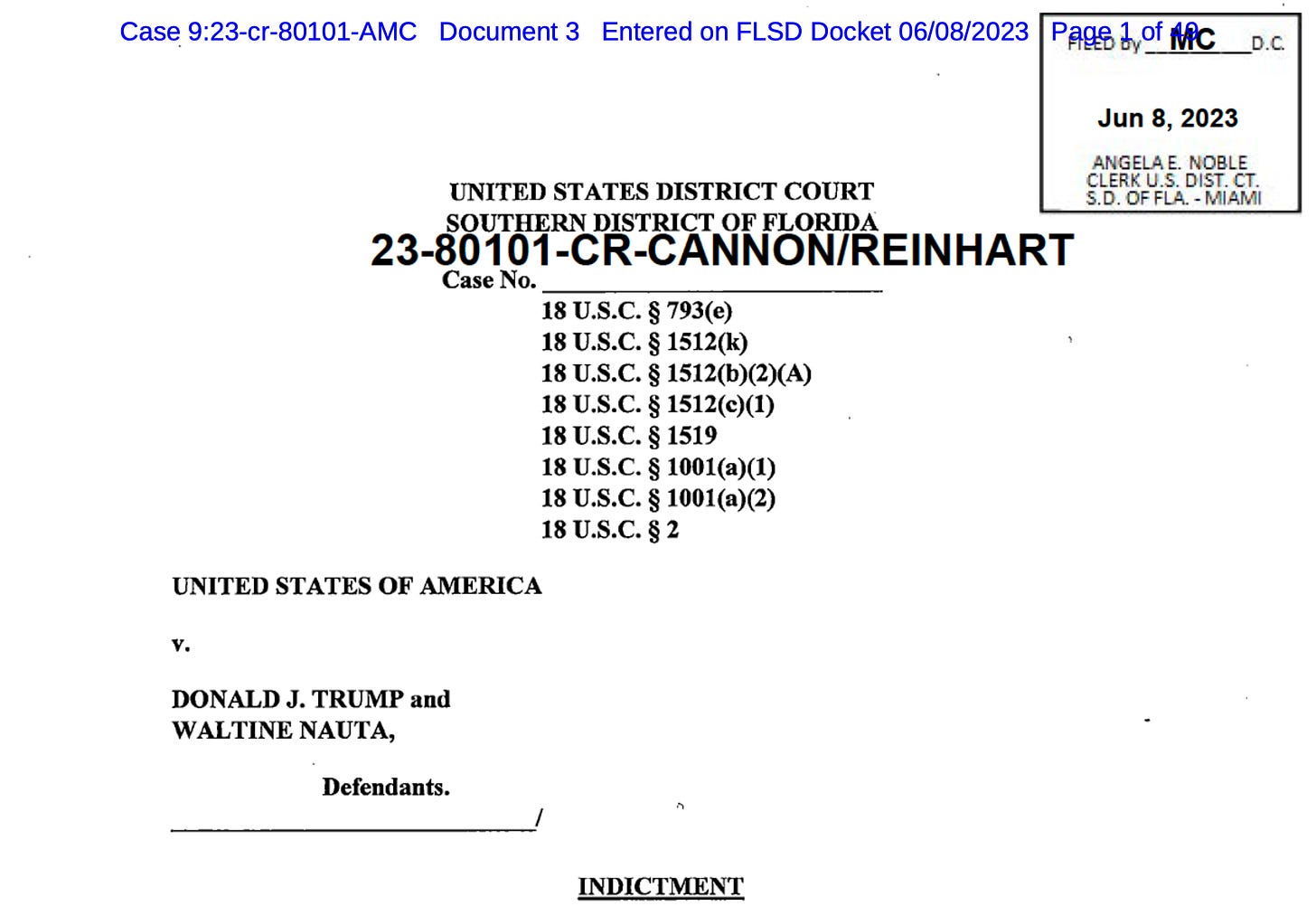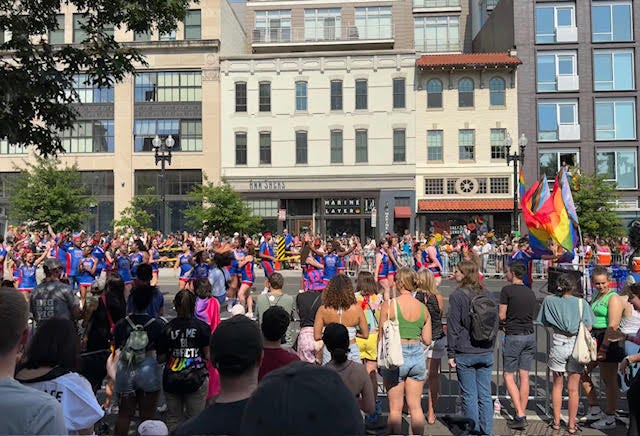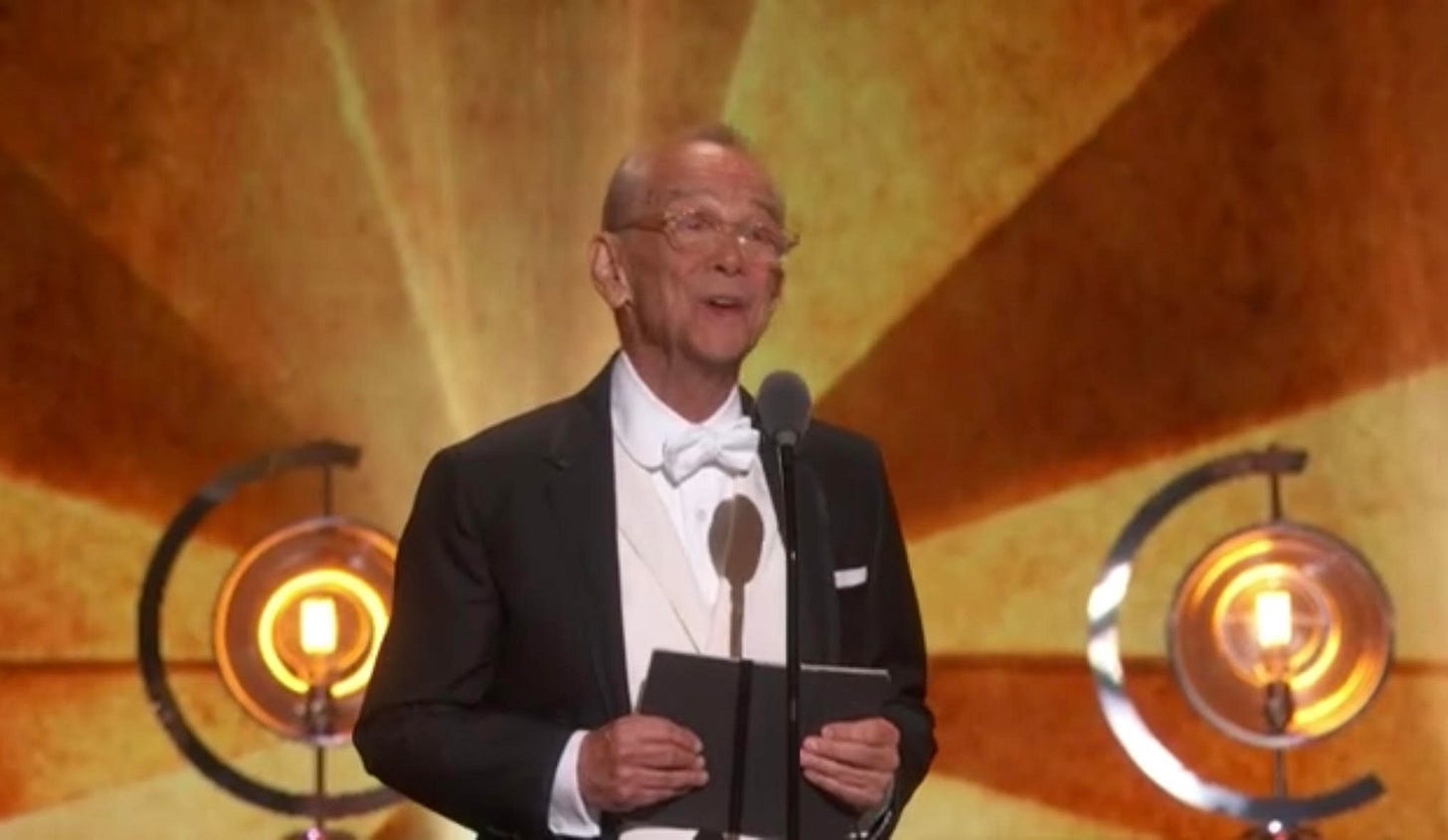37 counts, 23 cases, and Pride
Trump's (second) indictment, what's left at the Supreme Court, and LGBTQ Pride.
Donald Trump has been indicted. Again. This time in federal court.
The indictment, which was unsealed on June 9, sets forth 37 counts against the former president — including 31 counts of “willful retention of national defense information,” a charge of conspiring to obstruct justice, three charges relating to concealing documents, and one charge each of illegally withholding a document and causing false statements to be made.
In the narrative portion of the indictment, it discusses a conversation Trump allegedly had at his Bedminster club:
Later in the indictment, it includes a portion of a transcript of that recording, which was reported on by CNN and others in the run-up to the unsealing of the charges. The indictment includes this remarkable exchange:
The case is strong. Very strong. Even “Jonathan Turley thinks it’s strong” strong. If the claims hold up as alleged, it’s hard to imagine anyone other than Trump not being found guilty — or not just pleading out now.
But, it is Donald Trump. So, nothing is a given.
But, there’s more. Enter Aileen Cannon. At this point the case has been assigned to U.S. District Judge Aileen Cannon, who you might remember from the earlier disputes over the search of Mar-a-Lago.
As I put it here last September, “Judge Aileen Cannon is Trump’s best lawyer in years.”
Of course, the U.S. Court of Appeals was none-too-pleased with Cannon’s behavior then, and a three-judge panel that included two Trump appointees and Chief Judge William Pryor, a George W. Bush appointee who is one of the more prominent conservative appellate judges in the nation, unanimously ruled against Trump’s challenge to the search warrant, writing:
“[W]e are faced with a choice: apply our usual test; drastically expand the availability of equitable jurisdiction for every subject of a search warrant; or carve out an unprecedented exception in our law for former presidents. We choose the first option.”
The New York Times’s Charlie Savage and Slate’s Mark Joseph Stern have already written about the ways Cannon could overstep again, and, she absolutely could. The main question right now is whether Cannon took any lessons from her appellate court’s response to her last episode of shenanigans.
And, of course, what other indictments are yet to come.
SCOTUS, full steam ahead — eventually
With 23 Supreme Court cases that were argued this term remaining undecided, the court announced on June 9 that it is adding a second day for decisions this week. But, even with the addition of another day, no opinions are expected until Thursday. The added decision day is Friday.
Among the 23 cases remaining are cases addressing the future of race conscious admissions policies at universities; the “independent state legislature” scheme; the interplay between the First Amendment, religious adherents, and nondiscrimination laws; religious accommodations under Title VII of the Civil Rights Act; the Biden administration’s student loan forgiveness plan; and the Indian Child Welfare Act.
In addition to the decisions, we’re expecting orders out of last week’s conference at 9:30 a.m. Monday.
A very queer weekend
By way of explanation for the short Monday morning newsletter, this weekend was a double-dose of queer time away from working for me, between DC Pride and the Tony Awards.
Saturday’s parade gave me a chance to see many friends and to witness a community that has faced a dramatic increase in government-led and personal attacks this year come together to support one another — particularly to support our transgender friends, who are facing such cruel and dehumanizing treatment from so many corners.
My first Pride was also here in DC, in 1996. And while I’ve certainly attended more than my fair share of events and parades and festivals over the years since then, it felt important to be out and about this year in a way that I haven’t felt in quite some time.
Then, on Sunday evening, I got to watch as two gay men in their 90s — John Kander and Joel Grey — received lifetime achievement awards for their work in the theater at the Tony Awards. Jerry Mitchell, another gay man, received the Isabelle Stevenson Award for his work supporting Broadway Cares with Broadway Bares for more than 30 years.
Later, as the acting awards got underway, new ground was broken, with nonbinary performers Alex Newell and J. Harrison Ghee both winning awards. Newell was the first, winning the best featured actor in a musical award for their role in Shucked. Ghee won for their role in Some Like It Hot — which I saw, and they were absolutely a highlight. Two gay actors, Sean Hayes and Brandon Uranowitz, won the acting awards for best actor and best featured actor in a play, respectively.
The writers’ strike, which led to an unscripted ceremony, also got several mentions of support for the WGA throughout the night.
Finally, Michael Arden, who won best direction of a musical for the revival of Parade, said, “Growing up, I was called the ‘F-word’ more times than I can remember.” Then, in a part muted by CBS, he went on to say, “And all I can say now is I'm a faggot with a Tony!” Arden used much of his speech to talk about how he and the Broadway community support “trans, nonbinary, and queer youth.” He said they will fight alongside them against this wave of discrimination — and that “we will win.”









Love wins.❤️
Judge Cannon SHOULD recuse herself, but I doubt that she will. Should be quite interesting (and yes, by interesting I mean "a complete circus").....................